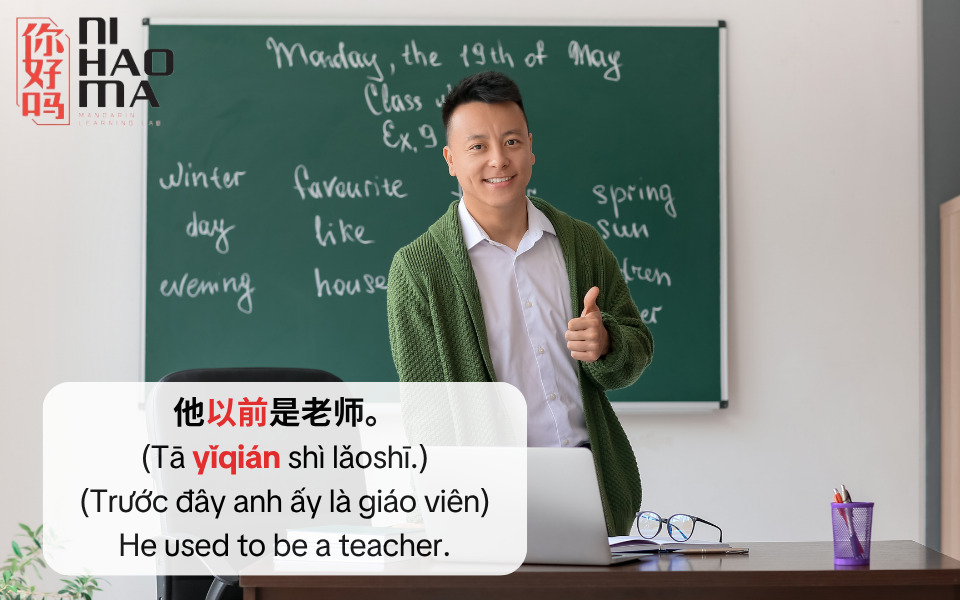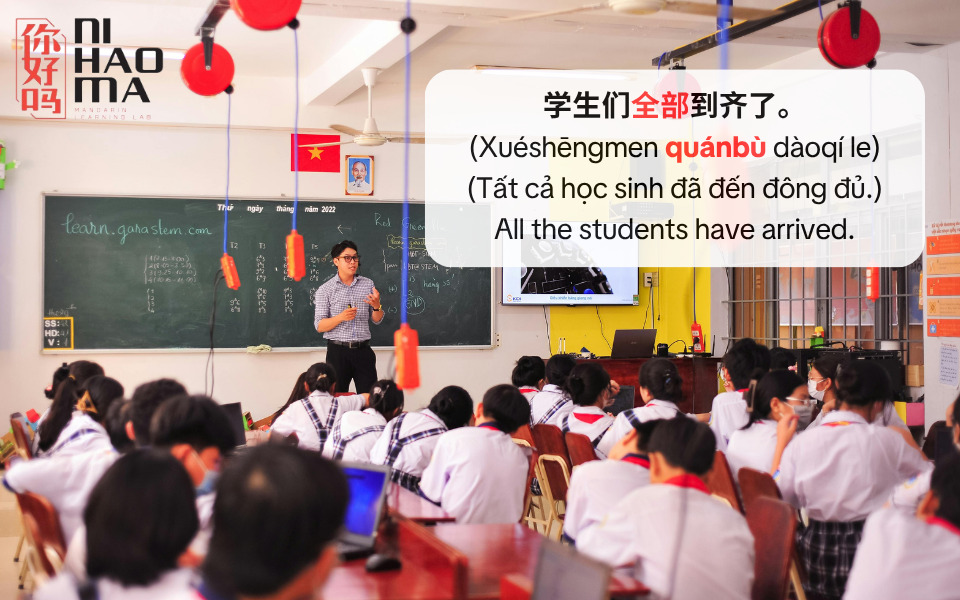When learning Chinese, adverbs are an essential yet often overlooked part of the language, as they are not always easy to recognize or use correctly. In fact, Chinese adverbs play a key role in making sentences more informative and expressive. This article from Ni Hao Ma will help you understand what adverbs are in Chinese, explore the most common types, and highlight important tips so you can apply them flexibly in your studies and everyday communication.
What are Chinese adverbs?
Adverbs (副词 /fùcí/) in Chinese are a class of words used to modify verbs, adjectives, or even other adverbs. They are used to express aspects such as degree, time, frequency, manner, scope, or affirmation/negation of an action, state, or characteristic.

Chinese adverbs contribute significantly to making sentences more detailed, expressive, and accurate. Unlike in Vietnamese, where adverb placement is relatively flexible, Chinese adverbs follow stricter placement rules—typically appearing before the verb or adjective they modify. Mastering how to use adverbs not only helps you form grammatically correct sentences but also makes your Chinese sound much more natural.
Types of Chinese Adverbs
Based on their function and meaning, Chinese adverbs can be categorized into several types. Below is one common category:
1. Chinese Adverbs of Degree
Adverbs of degree are used to describe the intensity or extent of an action, state, or attribute. They often modify adjectives or psychological verbs. One key feature of this group is their ability to intensify or downplay the meaning of the word they accompany. These adverbs are usually placed before the adjective or verb they modify. Some cannot stand alone and need to be used with intensifiers like “很 (hěn)” or “太 (tài)” to convey complete meaning.
| Adverb | Pinyin | Meaning | Examples |
|---|---|---|---|
| 很 | hěn | Very | 他很高兴。 Tā hěn gāoxìng. → He is very happy. |
| 非常 | fēicháng | Extremely | 她非常漂亮。 Tā fēicháng piàoliang. → She is extremely beautiful. |
| 特别 | tèbié | Especially | 今天特别冷。 Jīntiān tèbié lěng. → It’s especially cold today. |
| 十分 | shífēn | Very, greatly | 这个问题十分重要。 Zhège wèntí shífēn zhòngyào. → This issue is very important. |
| 挺 | tǐng | Quite (spoken) | 今天天气挺好的。 Jīntiān tiānqì tǐng hǎo de. → The weather is quite nice today. |
| 太……了 | tài…le | Too… (excessive) | 这个菜太辣了。 Zhège cài tài là le. → This dish is too spicy. |
| 极了 | jí le | Extremely (sentence-final) | 她高兴极了。 Tā gāoxìng jí le. → She is extremely happy. |
| 比较 | bǐjiào | Relatively/quite | 他比较忙。 Tā bǐjiào máng. → He is relatively busy. |
| 有点儿 | yǒudiǎnr | A bit (negative tone) | 我有点儿累。 Wǒ yǒudiǎnr lèi. → I’m a bit tired. |
| 一点儿 | yīdiǎnr | A little | 你再等一点儿吧。 Nǐ zài děng yīdiǎnr ba. → Please wait a little longer. |
| 稍微 | shāowēi | Slightly | 请稍微等一下。 Qǐng shāowēi děng yíxià. → Please wait a moment. |
| 更 | gèng | Even more | 他更喜欢看电影。 Tā gèng xǐhuān kàn diànyǐng. → He likes watching movies even more. |
| 最 | zuì | The most | 他是我们班最聪明的学生。 Tā shì wǒmen bān zuì cōngmíng de xuéshēng. → He’s the smartest student in our class. |
2. Chinese Adverbs of Time
Chinese adverbs of time are used to indicate the point in time, duration, or frequency of an action. They help establish the temporal context for an event or behavior. These adverbs typically appear before the verb (or before the subject if the speaker wants to emphasize time). Some can also appear at the beginning of a sentence for added emphasis.
| Adverb | Pinyin | Meaning | Examples |
|---|---|---|---|
| 已经 | yǐjīng | Already (completed) | 我已经吃饭了。 Wǒ yǐjīng chīfàn le. → I’ve already eaten. |
| 正在 | zhèngzài | In the process of | 他正在学习中文。 Tā zhèngzài xuéxí Zhōngwén. → He is studying Chinese. |
| 还 | hái | Still | 他还在工作。 Tā hái zài gōngzuò. → He’s still working. |
| 刚 | gāng | Just (recently) | 我刚到家。 Wǒ gāng dào jiā. → I just got home. |
| 刚才 | gāngcái | Just now | 刚才你去哪儿了? Gāngcái nǐ qù nǎr le? → Where did you just go? |
| 马上 | mǎshàng | Immediately, soon | 我马上回来。 Wǒ mǎshàng huílái. → I’ll be right back. |
| 立刻 | lìkè | Instantly (more formal) | 请立刻出发! Qǐng lìkè chūfā! → Please depart immediately! |
| 终于 | zhōngyú | Finally | 他终于来了。 Tā zhōngyú lái le. → He finally arrived. |
| 一直 | yìzhí | Continuously, always | 他一直努力工作。 Tā yìzhí nǔlì gōngzuò. → He always works hard. |
| 暂时 | zànshí | Temporarily | 我暂时住在朋友家。 Wǒ zànshí zhù zài péngyǒu jiā. → I’m temporarily staying at a friend’s house. |
| 曾经 | céngjīng | Once, ever | 我曾经去过北京。 Wǒ céngjīng qù guò Běijīng. → I’ve been to Beijing before. |
| 即将 | jíjiāng | About to (soon) | 比赛即将开始。 Bǐsài jíjiāng kāishǐ. → The match is about to begin. |
| 从来 | cónglái | Always/never (with negation) | 我从来没见过他。 Wǒ cónglái méi jiàn guò tā. → I’ve never seen him before. |
| 早就 | zǎojiù | Long ago, already | 我早就知道了。 Wǒ zǎojiù zhīdào le. → I’ve known it for a long time. |
| 最近 | zuìjìn | Recently | 我最近很忙。 Wǒ zuìjìn hěn máng. → I’ve been very busy recently. |
| 以后 | yǐhòu | Later, after | 吃饭以后我们去散步。 Chīfàn yǐhòu wǒmen qù sànbù. → We’ll go for a walk after eating. |
| 以前 | yǐqián | Before | 他以前是老师。 Tā yǐqián shì lǎoshī. → He used to be a teacher. |
| 同时 | tóngshí | At the same time | 她能同时做两件事。 Tā néng tóngshí zuò liǎng jiàn shì. → She can do two things at once. |
| 不久 | bùjiǔ | Soon, shortly | 他不久就回来了。 Tā bùjiǔ jiù huílái le. → He came back shortly after. |
| 当时 | dāngshí | At that time | 当时我不知道该怎么办。 Dāngshí wǒ bù zhīdào gāi zěnme bàn. → I didn’t know what to do at the time. |

3. Chinese Adverbs of Frequency
Chinese adverbs of frequency are commonly used in both spoken and written language. Their main function is to indicate how often an action or event occurs, similar to Vietnamese adverbs like “always,” “often,” “sometimes,” “rarely,” and “never.”
| Adverb | Pinyin | Meaning | Examples |
|---|---|---|---|
| 总是 | zǒngshì | Always | 他总是迟到。 Tā zǒngshì chídào. → He’s always late. |
| 经常 | jīngcháng | Frequently | 我经常去健身房。 Wǒ jīngcháng qù jiànshēnfáng. → I often go to the gym. |
| 常常 | chángcháng | Often | 她常常忘记带钥匙。 Tā chángcháng wàngjì dài yàoshi. → She often forgets her keys. |
| 时常 | shícháng | From time to time | 我们时常联系。 Wǒmen shícháng liánxì. → We keep in touch frequently. |
| 有时 | yǒushí | Sometimes | 他有时在家工作。 Tā yǒushí zài jiā gōngzuò. → He sometimes works from home. |
| 偶尔 | ǒu’ěr | Occasionally | 我偶尔吃快餐。 Wǒ ǒu’ěr chī kuàicān. → I occasionally eat fast food. |
| 很少 | hěnshǎo | Rarely | 我很少看电视。 Wǒ hěnshǎo kàn diànshì. → I rarely watch TV. |
| 几乎 | jīhū | Almost never | 他几乎不喝酒。 Tā jīhū bù hējiǔ. → He almost never drinks alcohol. |
| 从不 | cóng bù | Never | 我从不说谎。 Wǒ cóng bù shuōhuǎng. → I never lie. |
| 每天 | měitiān | Every day | 他每天跑步。 Tā měitiān pǎobù. → He runs every day. |
| 屡次 | lǚcì | Repeatedly | 他屡次迟到。 Tā lǚcì chídào. → He has been late many times. |
4. Chinese Adverbs Indicating Scope/Limit
Adverbs indicating scope or limit are used to express the extent or boundaries of an action, state, or object. They can indicate total inclusion, partial inclusion, or exclusivity of a particular object. These adverbs usually appear before the verb or adjective, and sometimes before the subject to emphasize the scope.
| Adverb | Pinyin | Meaning | Examples |
|---|---|---|---|
| 只 | zhǐ | Only | 我只吃了一个苹果。 Wǒ zhǐ chī le yí gè píngguǒ. → I only ate one apple. |
| 都 | dōu | All, every | 我们都来了。 Wǒmen dōu lái le. → We all came. |
| 就 | jiù | Only (emphasizing few, early, or limited) | 今天就我们两个人。 Jīntiān jiù wǒmen liǎng gè rén. → Today it’s just the two of us. |
| 一共 | yīgòng | In total | 我们一共有五个人。 Wǒmen yīgòng yǒu wǔ gè rén. → There are five of us in total. |
| 仅 | jǐn | Only (formal, written language) | 这仅是一个开始。 Zhè jǐn shì yí gè kāishǐ. → This is only the beginning. |
| 全部 | quánbù | Entire, all | 学生们全部到齐了。 Xuéshēngmen quánbù dàoqí le. → All the students have arrived. |
| 完全 | wánquán | Completely, entirely | 我完全同意你的看法。 Wǒ wánquán tóngyì nǐ de kànfǎ. → I completely agree with your opinion. |
| 所有 | suǒyǒu | All, every | 所有问题都解决了。 Suǒyǒu wèntí dōu jiějué le. → All the problems have been solved. |

5. Adverbs Indicating Manner/State
These adverbs describe how an action is performed or the state in which something occurs. A key feature of many of these adverbs is that they are often followed by the structural particle 地 (de), forming the structure “adverb + 地 + verb/adjective”. However, some can stand alone without 地.
| Adverb | Pinyin | Meaning | Examples |
|---|---|---|---|
| 慢慢地 | mànmàn de | Slowly | 他慢慢地走进教室。 Tā mànmàn de zǒu jìn jiàoshì. → He slowly walked into the classroom. |
| 认真地 | rènzhēn de | Seriously | 他认真地完成了作业。 Tā rènzhēn de wánchéng le zuòyè. → He completed the homework seriously. |
| 小心地 | xiǎoxīn de | Carefully | 小心地拿起这只杯子。 Xiǎoxīn de ná qǐ zhè zhī bēizi. → Carefully pick up this cup. |
| 轻轻地 | qīngqīng de | Gently, softly | 她轻轻地敲门。 Tā qīngqīng de qiāo mén. → She gently knocked on the door. |
| 专心地 | zhuānxīn de | Attentively | 孩子们专心地听老师讲课。 Háizimen zhuānxīn de tīng lǎoshī jiǎngkè. → The children listened attentively to the teacher. |
| 快速地 | kuàisù de | Quickly | 他快速地回答了问题。 Tā kuàisù de huídá le wèntí. → He answered the question quickly. |
| 仔细地 | zǐxì de | Carefully, thoroughly | 请仔细地检查一下报告。 Qǐng zǐxì de jiǎnchá yíxià bàogào. → Please check the report carefully. |
| 直接 | zhíjiē | Directly | 你可以直接问他。 Nǐ kěyǐ zhíjiē wèn tā. → You can ask him directly. |
| 顺利 | shùnlì | Smoothly, successfully | 事情进行得很顺利。 Shìqing jìnxíng de hěn shùnlì. → Things are going very smoothly. |
| 特意 | tèyì | Intentionally, on purpose | 我是特意来找你的。 Wǒ shì tèyì lái zhǎo nǐ de. → I came here especially to see you. |
| 按时 | ànshí | On time, on schedule | 他总是能够按时完成工作。 Tā zǒng shì nénggòu ànshí wánchéng gōngzuò. → He is always able to finish work on time. |
| 随意 | suíyì | Freely, as one likes | 你可以随意选择。 Nǐ kěyǐ suíyì xuǎnzé. → You can choose freely. |
| 突然 | tūrán | Suddenly, unexpectedly | 他突然出现了。 Tā túrán chūxiàn le. → He suddenly appeared. |
6. Affirmative Adverbs
Affirmative adverbs in Chinese are used to express certainty, firm affirmation, or assurance by the speaker regarding the content of a sentence. These adverbs often emphasize belief, agreement, or a clear confirmation of an action, phenomenon, or state.
| Adverb | Pinyin | Meaning | Examples |
|---|---|---|---|
| 确实 | quèshí | Truly, indeed | 这件事确实很重要。 Zhè jiàn shì quèshí hěn zhòngyào. → This matter is indeed very important. |
| 当然 | dāngrán | Of course, naturally | 你当然可以参加。 Nǐ dāngrán kěyǐ cānjiā. → Of course you can participate. |
| 一定 | yídìng | Definitely, certainly | 我一定会完成任务。 Wǒ yídìng huì wánchéng rènwù. → I will definitely complete the task. |
| 肯定 | kěndìng | Certainly, affirmatively | 他肯定会来。 Tā kěndìng huì lái. → He will definitely come. |
| 真的 | zhēn de | Really, truly | 我真的很喜欢这本书。 Wǒ zhēn de hěn xǐhuān zhè běn shū. → I really like this book. |
| 确切 | quèqiè | Precise, exact | 这个信息确切无误。 Zhège xìnxī quèqiè wúwù. → This information is precisely correct. |
| 绝对 | juéduì | Absolutely | 我绝对支持你。 Wǒ juéduì zhīchí nǐ. → I absolutely support you. |

7. Negative Adverbs
Negative adverbs are extremely important in Chinese. They are used to negate an action, state, or fact. In terms of placement, they typically appear before the verb or verb phrase, but may also come before modal verbs like 会 (huì), 能 (néng), 要 (yào), etc. Negative adverbs can affect both the tone and meaning of a sentence, so choosing the right one is crucial for conveying the intended message.
| Adverb | Pinyin | Meaning | Examples |
|---|---|---|---|
| 不 | bù | Not | 我不喜欢喝咖啡。 Wǒ bù xǐhuān hē kāfēi. → I don’t like drinking coffee. |
| 没 / 没有 | méi / méiyǒu | Not, didn’t (negating the past) | 他没来上课。 Tā méi lái shàngkè. → He didn’t come to class. |
| 不再 | bú zài | No longer | 我不再相信他了。 Wǒ bú zài xiāngxìn tā le. → I no longer believe him. |
| 从不 / 从来不 | cóng bù / cónglái bù | Never (habitual) | 他从不迟到。 Tā cóng bù chídào. → He is never late. |
| 从没 / 从来没 | cóng méi / cónglái méi | Never (in the past) | 我从来没去过北京。 Wǒ cónglái méi qù guò Běijīng. → I’ve never been to Beijing. |
| 绝不 | juébù | Absolutely not | 我绝不会放弃。 Wǒ juébù huì fàngqì. → I will absolutely never give up. |
| 未 | wèi | Not yet (formal/written) | 他未到达现场。 Tā wèi dàodá xiànchǎng. → He has not yet arrived at the scene. |
| 无 | wú | Without, no (formal/literary) | 此事与我无关。 Cǐ shì yǔ wǒ wú guān. → This matter has nothing to do with me. |
8. Modal Adverbs (Attitudinal Adverbs)
Modal adverbs are used to convey the speaker’s attitude, judgment, evaluation, or emotion regarding the action or event described in the sentence. Unlike other types of adverbs, modal adverbs are highly subjective and allow the speaker to subtly and flexibly express their personal views or feelings. They usually appear before the main verb or at the beginning of the sentence for emphasis.
| Adverb | Pinyin | Meaning | Examples |
|---|---|---|---|
| 可能 | kěnéng | Possibly, may | 他可能会迟到。 Tā kěnéng huì chídào. → He may be late. |
| 难道 | nándào | Could it be that…? (rhetorical) | 难道你不喜欢吗? Nándào nǐ bù xǐhuan ma? → Don’t you like it? |
| 或许 | huòxǔ | Perhaps, maybe | 或许他不知道。 Huòxǔ tā bù zhīdào.→ Maybe he doesn’t know. |
| 竟然 | jìngrán | Unexpectedly | 他竟然没来。 Tā jìngrán méi lái. → He unexpectedly didn’t come. |
| 居然 | jūrán | Surprisingly | 她居然答应了。 Tā jūrán dāyìng le. → She actually agreed. |
| 大概 | dàgài | Probably, roughly | 他大概在家。 Tā dàgài zài jiā. → He’s probably at home. |
| 恐怕 | kǒngpà | I’m afraid, perhaps | 恐怕明天会下雨。 Kǒngpà míngtiān huì xiàyǔ. → I’m afraid it will rain tomorrow. |
| 总算 | zǒngsuàn | Finally, at last | 我们总算完成了任务。 Wǒmen zǒngsuàn wánchéng le rènwu. → We finally completed the task. |
| 毕竟 | bìjìng | After all | 毕竟他是第一次来。 Bìjìng tā shì dì yī cì lái. → After all, it’s his first time here. |
| 未必 | wèibì | Not necessarily | 他未必会同意。 Tā wèibì huì tóngyì. → He may not agree. |
| 简直 | jiǎnzhí | Simply, really | 他简直是个天才。 Tā jiǎnzhí shì gè tiāncái. → He is simply a genius. |
Notes on Using Adverbs in Chinese
Using adverbs in Chinese helps express personal nuances and makes communication more natural. However, there are several important points to keep in mind to avoid grammatical errors or overly complicated sentences.
Position of Adverbs
The position of adverbs in Chinese is crucial for grammatical accuracy and natural expression. Unlike in Vietnamese, where adverbs can be more flexible, in Chinese, adverbs usually occupy fixed positions — typically before the verb or adjective they modify. However, the rules may vary depending on the type of adverb (e.g., degree, frequency, time, negation, modality, etc.).
| Type of Adverb | Common Position | Examples |
|---|---|---|
| Degree | Before adjective or verb | 她很漂亮。 Tā hěn piàoliang. → She is very beautiful. |
| Frequency | Before verb | 我常常去那儿。 Wǒ chángcháng qù nàr. → I often go there. |
| Negation | Before auxiliary or main verb | 他不喜欢咖啡。 Tā bù xǐhuān kāfēi. → He doesn’t like coffee. |
| Time | Before verb or at the beginning of sentence | 他已经走了。 Tā yǐjīng zǒu le. → He has already left. |
| Modality | Before auxiliary verb or at the beginning | 可能他今天不来。 Kěnéng tā jīntiān bù lái. → He might not come today. |
| Exclamatory | Sentence-initial or before verb | 居然成功了! Jūrán chénggōng le! → It actually succeeded! |
| Scope | After subject, before verb | 我只想休息一下。 Wǒ zhǐ xiǎng xiūxí yīxià. → I just want to rest a bit. |
| Manner/State | Before or after verb, depending on structure | 他慢慢地走进房间。 Tā mànmande zǒu jìn fángjiān. → He slowly walked into the room. |
Some adverbs (like time-related, certain frequency or modality adverbs) can stand at the beginning of a sentence for emphasis or context. Others (like degree, negation, or scope adverbs) usually follow strict positioning before verbs/adjectives and shouldn’t be placed at the start.
The Structural Particle “地 (de)”
It’s important to remember that the structural particle 地 (de) does not need to appear with every adverb. If the adverb is inherently a standalone word indicating degree, time, frequency, or scope, then 地 is unnecessary.
For example:
- 我很喜欢他 (Wǒ hěn xǐhuan tā) – I really like him.
Here, 很 (hěn) functions as a degree adverb and doesn’t need 地.
Adverbs Do Not Modify Nouns Directly
A common mistake is trying to use adverbs to directly modify nouns. In Chinese, adverbs can only modify verbs, adjectives, or other adverbs—not nouns. To describe nouns, you need to use attributive structures (like adjectives or adjective phrases/clauses) paired with the structural particle 的 (de).
Distinguishing Similar or Synonymous Adverbs
Another challenge is dealing with adverbs that appear synonymous but have subtle differences in tone, intensity, or usage context. Mastering these nuances is essential for accurate and natural expression.
Example:
- 经常 (jīngcháng) and 常常 (chángcháng) both mean “often,” but:
- 经常 implies regularity and stability.
- 常常 is more flexible and used more in habitual contexts.
Avoid Overusing or Stacking Too Many Adverbs
Though adverbs enrich sentences, overusing them can backfire, making the sentence bloated or unnatural—like over-seasoning a dish.
Examples:
- ✅ 他非常认真。(Tā fēicháng rènzhēn.) – He is extremely serious.
- ❌ 他特别非常相当地认真。(Tā tèbié fēicháng xiāngdāng de rènzhēn.) – This is awkward and unnatural.
However, if the adverbs are of different types, they can coexist in a sentence. Chinese has a preferred order when combining multiple adverbs:
Time/Frequency → Scope → Degree → Manner/State → Verb/Adjective
Example:
- 他非常认真地工作。Tā fēicháng rènzhēn de gōngzuò.
→ He works extremely seriously.
Here, 非常 (degree) and 认真地 (manner) are used together correctly.
Conclusion
Chinese adverbs are an essential component that helps make Chinese sentences clearer, more expressive, and more vivid. Through this article by Ni Hao Ma, you’ve explored different types of Chinese adverbs along with clear and detailed examples. Mastering this knowledge will provide a solid foundation for improving your reading comprehension and expressing yourself more naturally in Chinese.



